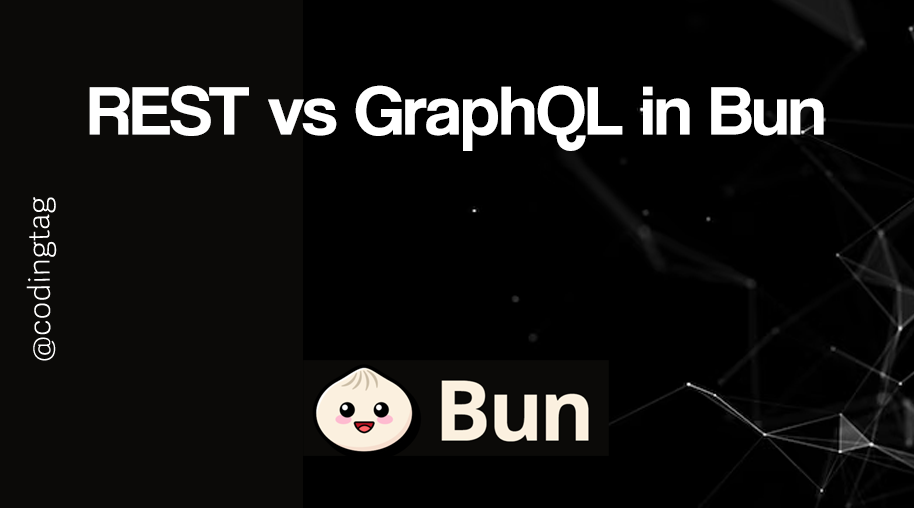REST vs GraphQL in Bun
0 625
âš”ï¸ REST vs GraphQL in Bun
In the world of APIs, two giants dominate the scene — REST and GraphQL. When you're building with Bun, the fastest JavaScript runtime on the block, choosing the right API architecture is more than just preference — it's about performance, flexibility, and dev experience 💡. In this tutorial, we’ll compare REST and GraphQL in the context of Bun. We’ll cover setup, code patterns, performance, and real-world usage to help you decide which one suits your next Bun-powered project best 🚀.🧱 Basic Concepts: REST vs GraphQL
REST (Representational State Transfer) is a convention-based architecture that uses endpoints like/users and HTTP methods like GET, POST, PUT, DELETE.
GraphQL is a query language for APIs that lets clients specify exactly what data they need — no more, no less 🎯.
🔧 Setting Up REST API in Bun
Creating a REST API in Bun is straightforward using its nativeBun.serve function.
const users = [
{ id: 1, name: "Alice" },
{ id: 2, name: "Bob" }
];
Bun.serve({
port: 3000,
fetch(req) {
const url = new URL(req.url);
if (req.method === "GET" && url.pathname === "/users") {
return new Response(JSON.stringify(users), {
headers: { "Content-Type": "application/json" }
});
}
return new Response("Not Found", { status: 404 });
}
});
âš™ï¸ Setting Up GraphQL API in Bun
GraphQL requires a schema and resolvers. Bun handles it smoothly with thegraphql package.
import { buildSchema, graphql } from "graphql";
const schema = buildSchema(`
type Query {
users: [User]
}
type User {
id: ID
name: String
}
`);
const root = {
users: () => [
{ id: 1, name: "Alice" },
{ id: 2, name: "Bob" }
]
};
Bun.serve({
port: 3000,
fetch: async (req) => {
const { query } = await req.json();
const result = await graphql({ schema, source: query, rootValue: root });
return new Response(JSON.stringify(result), {
headers: { "Content-Type": "application/json" }
});
}
});
📊 Performance Comparison
- 🚀 Bun + REST is blazing fast for simple, flat data structures and fewer endpoints.
- âš¡ Bun + GraphQL shines when clients need custom data shapes or nested queries.
🎯 Use Cases: When to Use What?
| Scenario | Choose REST | Choose GraphQL |
| Simple CRUD API | ✅ | ⌠|
| Frontend-controlled queries | ⌠| ✅ |
| Strong caching via HTTP | ✅ | ⌠|
| Real-time data needs | ⌠| ✅ (with subscriptions) |
💡 Developer Experience
Bun's fast startup and instant reloads make developing both REST and GraphQL fun. But here's how they differ:- 🧩 REST is easier for beginners and faster to prototype.
- 🔠GraphQL offers powerful introspection, auto-generated docs, and one endpoint to manage.
🪵 Logging and Debugging
Logging with Bun is super efficient. Here's a quick logger to track REST or GraphQL requests:function logger(req) {
console.log(`[${new Date().toISOString()}] ${req.method} ${req.url}`);
}
🔠Security Considerations
- 🔒 REST APIs should validate request bodies and implement route-based access control.
- 🔒 GraphQL needs query depth limiting and complexity analysis to prevent abuse.
🚀 Final Verdict: REST vs GraphQL in Bun
There's no universal winner — it’s all about your use case.- Go with REST if you want simple, traditional APIs with strong HTTP caching and easier tooling.
- Go with GraphQL if you’re building modern SPAs, need nested data, or want full control on the client side.
If you’re passionate about building a successful blogging website, check out this helpful guide at Coding Tag – How to Start a Successful Blog. It offers practical steps and expert tips to kickstart your blogging journey!
For dedicated UPSC exam preparation, we highly recommend visiting www.iasmania.com. It offers well-structured resources, current affairs, and subject-wise notes tailored specifically for aspirants. Start your journey today!

Share:







Comments
Waiting for your comments